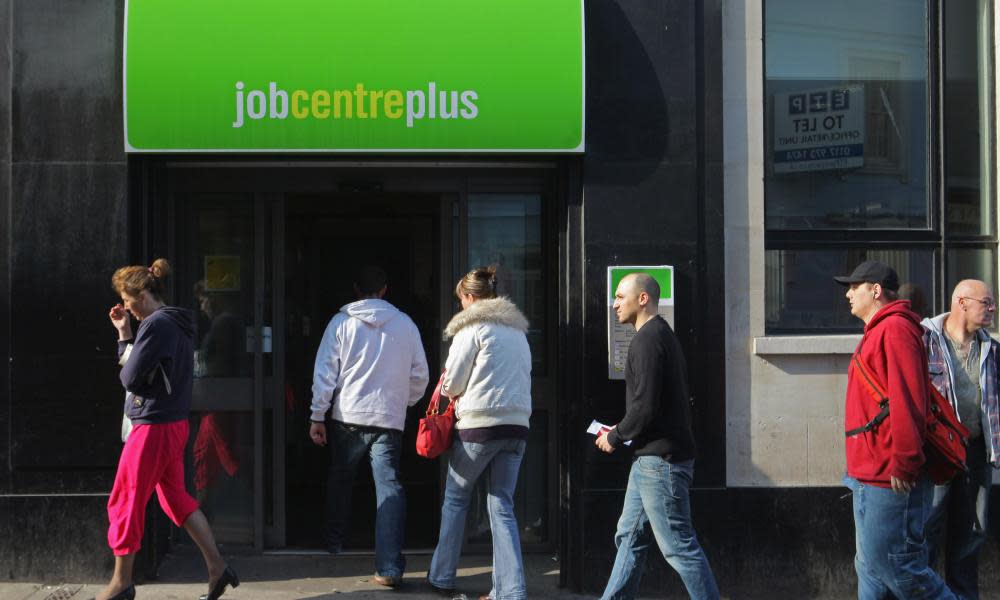Benefit sanctions to return in England as jobcentres reopen

The work and pensions secretary, Thérèse Coffey, has indicated benefit sanctions will be reintroduced this week as jobcentres in England start to reopen after lockdown, saying it is important claimant rules are reinstated.
Face-to-face meetings in jobcentres were suspended in March, and with them the system of “claimant conditionality” – a set of rules that require people to agree to carry out job search activities as a condition of claiming benefits.
Speaking in the House of Commons, Coffey refused to extend the arrangements after the three-month period finished on Tuesday. “It’s important that as the jobcentres fully reopen this week, we do reinstate the need for having a claimant commitment,” she said.
Sanctions are much-criticised financial penalties whereby claimants are docked at least four weeks’ benefit income if they break conditionality agreements, such as failing to attend a jobcentre interview or to spend enough time searching for jobs.
The decision immediately came under fire from Jonathan Reynolds, the shadow work and pensions secretary, who said it was “incomprehensible” that the government was threatening to reduce people’s financial support at a time when unemployment had risen sharply and job vacancies had dropped.
Poverty charities also criticised the move: Iain Porter, a policy manager at the Joseph Rowntree Foundation, said: “The social security system must not be used to force people into searching for jobs which currently don’t exist at a time when many will still be facing restrictions.”
Ayaz Manji, the senior policy officer at the mental health charity Mind, called the decision “appalling” and demanded it be reversed. “Suspending benefit sanctions was put in place to protect people from the impact of coronavirus. But reintroducing sanctions when coronavirus is still very much an issue is nonsensical,” Manji said.
Abi Gill, the policy manager of the homelessness charity Centrepoint, said: “This simply isn’t a time for talking tough. The fact is that sanctions were never effective in helping people find jobs and they’re nothing short of cruel now those looking for work vastly outnumber an ever-shrinking number of vacancies”.
However, the Department for Work and Pensions insisted that conditionality arrangements would be sensitive to new claimants’ local jobs market and personal circumstances, and that clear guidance would be issued to staff to ensure people were not sanctioned unless they breached conditionality “for no good reason”.
A DWP spokesperson said: “Now our focus is rightly switching to getting Britain back into work. From July, people can make an appointment with their work coach if they can’t get the help they want online or over the phone and work coaches will be calling all claimants to help them get ready for the world of work.”
Although the new conditionality arrangements would apply to new claimants, existing claimants would for now keep their existing job search agreements, suggesting that DWP officials will be given a large degree of discretion in judging whether sanctionable breaches of the rules have occurred.
The announcement came as the main union representing DWP staff warned that many jobcentres would be expected to open on 1 July without having conducted a proper Covid-19 risk assessment, creating a risk of staff and public getting or spreading the virus.
A staff survey by the PCS union revealed widespread concerns that there was insufficient space in jobcentres to implement a safe 2-metre social distancing requirement between staff and claimants, as well as a lack of plastic screens and personal protective equipment.
A jobcentre official said: “This is a major change but there’s been no full health and safety risk assessment that looks at how the public and staff will be kept safe.”
The DWP insisted that “staff and customer safety is our priority” and that sites were being “adapted to ensure they are Covid-19 safe”. It said it was fitting screens and social distancing signage, and providing masks and hand sanitisation facilities.

 Yahoo News
Yahoo News 
